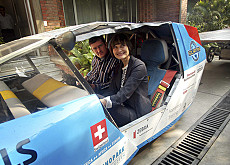
Foreign ministry adopts green flight plan

The Swiss foreign ministry has signed a contract to offset its air travel greenhouse gas emissions by supporting an ecologically friendly power plant in India.
The ministry has agreed to buy SFr650,000 ($565,000) of carbon credits from the Malavalli biomass facility to ensure that flights taken by its Bern-based staff will be carbon neutral for the next three years.
The carbon credit – or certified emissions reductions – system was set up under the Kyoto Protocol to help developed countries reach their CO2 reduction targets by investing in clean energy projects primarily in developing nations.
Switzerland is a Kyoto signatory but the deal to offset around 18,000 tons of carbon emissions, signed as Foreign Minister Micheline Calmy-Rey visited New Delhi on Monday, is voluntary and will not count towards the country’s promised targets.
Switzerland has committed itself to reducing CO2 emissions by nine million tons between 2008-2012. It has also pledged to bring emissions from fossil fuels down to ten per cent below 1990 levels.
“By signing this contract, the Swiss government wants to demonstrate its contribution to the fight against global warming,” said Calmy-Rey, who is also Swiss president this year under the rotational system.
The Malavalli power plant in the southern Indian state of Karnataka was chosen because it is the first project in the world to be awarded Gold Standard status for sustainability. It burns agricultural waste products to create energy for the locality and turns the resultant ash into fertilisers for farmers in the region.
Carbon credit broker
An Indian project was also selected because Switzerland has a long tradition of cooperation and aid development programmes in the country.
Swiss company South Pole Carbon Asset Management helped set up the deal by working on behalf of the enterprise that runs the power plant to secure the carbon credits in the first place.
The spin-off firm of the Federal Institute of Technology in Zurich acts as a specialist broker in the carbon credit trade.
“We evaluated many projects and spent many months finding one that was not just a concept or a dream but a distinctive project that offers sustainability and a holistic approach that benefits the local community,” South Pole managing director Christoph Sutter told swissinfo.
“We focus on only high-quality products and have carved out a niche role with this approach.”
Free trade hopes
The Malavalli power plant is one of around 350 projects in India to be awarded carbon credits because it is registered under the Clean Development Mechanisms of the Kyoto Protocol. The Swiss Agency for Development and Cooperation (SDC) will buy the credits on behalf of the foreign ministry.
Calmy-Rey started a four-day official visit to India on Monday with the aim of intensifying Switzerland’s links with the emerging economic power.
The visit hopes to conclude with the signing of a joint declaration on privileged partnership that could pave the way for a proposed Free Trade Agreement between India and the Efta states of Switzerland, Norway, Iceland and Liechtenstein.
It would also lay the foundations for cooperative ventures in the fields of the environment, science, research and sustainable development.
swissinfo, Matthew Allen in New Delhi
The Malavalli biomass power plant supplies clean power to 10,500 people living in 48 villages near the southern city of Bangalore.
It is run by a private enterprise called MPPL Renewable Energy which has created around 500 jobs in the plant’s operation, the distribution of electricity and the management of the biomass chain.
Up to 160 tons of organic material, mainly coconut tree toppings and sugar cane by-products, are burned in the plant’s furnace every day.
It is estimated that the biomass station saves up to 20,000 tones of CO2 a year compared with conventional power plants in the region.
Swiss adventurer Louis Palmer recently arrived in New Delhi in his solar powered “taxi” – four months into a round-the-world trip that started in Lucerne on July 13 to raise awareness about global warming.
He has completed 12,000km of the 50,000km trip that has taken him through 17 countries so far, including Hungary, Greece, Turkey, Syria, Lebanon, Saudi Arabia and Dubai. By the end of the journey he will have covered 50 countries in five continents.
The car, which is powered completely from solar panels, has run “like a Swiss clock”, apart from two minor crashes in Syria and one in Jaipur, India, according to Palmer.
After crashing in Syria, Palmer was given a police escort complete with blaring sirens through the rest of the country.
The highlight of his trip so far has been the “overwhelming” attention from media and the public in all of the countries visited, that Palmer says proves his message is getting across.

In compliance with the JTI standards
More: SWI swissinfo.ch certified by the Journalism Trust Initiative





























You can find an overview of ongoing debates with our journalists here . Please join us!
If you want to start a conversation about a topic raised in this article or want to report factual errors, email us at english@swissinfo.ch.